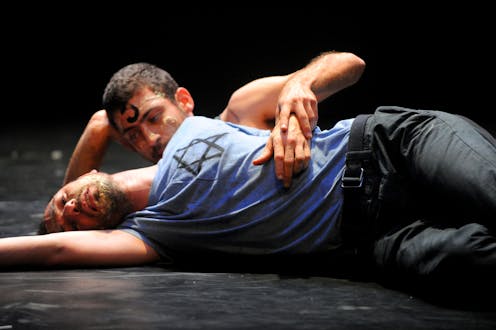We Love Arabs: accomplished satire offers food (and hummus) for thought
- Written by Asher Warren, Tutor and Researcher in Theatre and Performance Studies, University of Melbourne

We Love Arabs, staged as part of the Melbourne Festival at the Malthouse Theatre, brings together dance and theatre to explore Middle Eastern politics, and is a unique pleasure to watch. Australian audiences might recognise a similar fusion in recent works such as Chunky Move’s Complexity of Belonging, and Nicola Gunn’s Piece for Person and Ghetto Blaster.
Devised by Israeli dancer and choreographer Hillel Kogan, the performance opens in silence. A spotlight illuminates Kogan, meditatively poised on one foot. After a moment, he breaks this pose and addresses the audience. “I would like to share with you some thoughts on the challenges I’m having with my creative process.”
From that point on, he barely stops talking, and narrates us through a hilariously tortured attempt at creating an artwork exploring the relations between Israeli Jews and Arabs.
The humour of We Love Arabs is masterful, and works at many levels: one does not need to understand contemporary dance, nor Middle Eastern politics to laugh, but there are treasures here for those who do. At the heart of the comedy is Kogan, who skewers himself in almost every way imaginable, from his identity as an Israeli Jew, to choreographer, dancer, and left-winger. We Love Arabs shows just how far “good intentions” can miss the mark.
The challenge facing Kogan’s creative process, initially, appears in vague terms. There are spaces, he tells us, where his body can “feel the space” - and the space his body - but there is also another space, a space which is “not him”. He ties himself in knots trying to find a way to articulate this “not me”.
At one level, this works by poking fun at dance and dancers. Kogan’s incessant inanities on the rehearsal floor, are all too familiar. This comedy extends throughout the choreography. Many of the jokes actually find their punchlines in gesture and form, allowing even the most unfamiliar audiences to dance an entry point.
Adi Boutrous is enlisted to perform as the “Arab dancer”. The dynamic is established quickly, as Kogan realises that Boutrous does not look like the stereotypical Arab he imagined. They need, Kogan insists, signs for the audience, so he requests Boutrous draw on him the Star of David. Then, on Boutrous’s forehead, he inscribes the Islamic crescent. Boutrous asks: “what did you draw on me?” Kogan replies: “the thing from the Mosque”. Boutrous, a brilliant comic foil, quietly responds: “I am a Christian”.
This exchange is one of many in the performance where the well meaning, left leaning artist reveals his ignorance and prejudice, a point which would seem heavy handed if not so well wrapped in comedy. As the work progresses, Kogan’s narcissism continues to manifest, culminating in the introduction of hummus as a “choreographic texture” that might unite them.
Throughout the performance we hear only a few words from Boutrous, who speaks - and indeed dances - only on the terms dictated by Kogan. The power dynamic depicted here speaks more broadly to issues of inequality.
The piece draws our attention to the problematic “help” provided by the well-intentioned, through 55 minutes of quite enjoyable self-flagellation. There is an issue here in that we might mistake the observation of a problem for the hard work of actually addressing it. Just as a woke-bro mansplaining feminism can recognise inequality while still being part of the problem, We Love Arabs takes an important step, but one that can all too readily fall into self-satisfaction.
The piece concludes with hummus and flat-bread. Boutros holds the bowl while Kogan tears off bits of bread, dips them in hummus and feeds them to the front row of the audience. Whispers ripple through the audience, “it’s the sacrament”, I hear. Indeed, the image is unmistakable, and it’s tempting to walk away with this image of peaceful communion.
But this would be to miss one final joke: the irony that the body of Christ could bring the Jews and Arabs together. If there is a take away here, it is this: you should always question what you’re being fed.
Authors: Asher Warren, Tutor and Researcher in Theatre and Performance Studies, University of Melbourne





